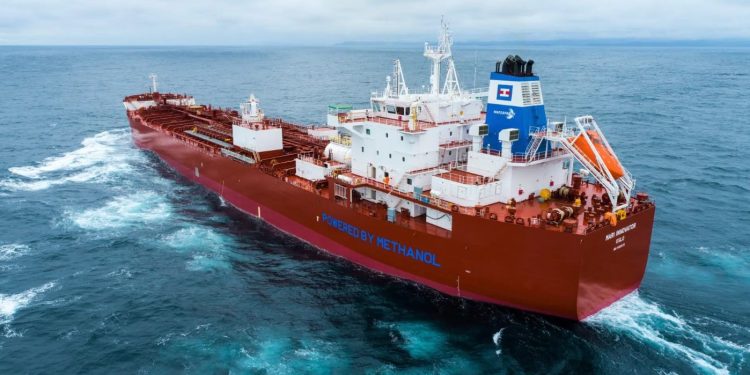Waterfront Shipping, a subsidiary of Methanex, has entered into a time-charter agreement with Trafigura, for the latter to operate the the 2021-built methanol dual-fuel product tanker Mari Innovator.
Under the agreement, Trafigura will operate the co-owned Waterfront Shipping and Clean Sea medium-range product tanker, Mari Innovator, as part of its global network of vessels used in clean products trading routes.
This agreement supports the parties’ efforts to help transition the marine shipping industry toward decarbonization and is another example of Waterfront Shipping’s leadership in supporting the growing demand for methanol as a marine fuel
said Waterfront Shipping.
As of today, Waterfront Shipping has 18 methanol dual-fuel vessels, with one additional vessel arriving by the spring of 2023, representing approximately 60% of its 30-vessel fleet.
We’re pleased to partner with Trafigura to share our global experience and knowledge with operating and bunkering vessels using methanol fuel technology
said Paul Hexter, President of Waterfront Shipping.
Moreover, Andrea Olivi, Head of Wet Freight for Trafigura added that the company is “advocating for industry-wide action on shipping emissions and investing in new technologies and vessels to help achieve a more sustainable shipping industry”.
As Andrea Olivi further explained, this development forms part of Trafigura’s efforts to explore how methanol technology can integrate with its fleet to achieve a carbon intensity reduction goal of 25% by 2030 across its chartering operation.
Continuing, Modi Mano, CEO at Clean Sea Transport, highlighted that the Mari Innovator is a third-generation dual-fuel vessel, that:
Offers a number of advantages to Trafigura including the flexibility to diversify fuel options or consume methanol for potential cost savings. It is equipped with the latest technological innovations and fuel consumption is particularly low for a medium-range tanker
Earlier this year, Georgios Plevrakis, ABS Vice President, Global Sustainability, had stated that methanol represents a promising fuel source for the global fleet, with practical benefits related to ease of storage and handling, tank to wake carbon intensity reduction, as well as a pathway to carbon neutrality through green methanol.
After an in-depth evaluation of the emerging fuels landscape and propulsion technology by ABS, Mr. Plevrakis believes that:
Methanol presents an immediate and promising solution with practical advantages in storage, handling and carbon intensity reduction potential which is gaining traction in the market. The further development of green methanol (e.g. electrolysis and biogenic carbon) provides a viable option for carbon neutral operations

































































